A Clear Memory of Bob Knight
Seeing the Good, the Bad, & the Ugly
If you’re a casual fan of spectator sports in the United States, Bob Knight was the college basketball coach who, in protest of the officiating, threw a chair across the court in the middle of a game in 1985. Here in Indiana, he was something more like royalty, and reigned high over all basketball in this state, perhaps known best for its people’s love affair with the sport.
He was often referred to as “the General,” not only because he began his career at Army, where among his players was a young point guard named Mike Kryzewski, but because, on the basketball court, his rule was absolute. The head coach at Indiana University from 1971 to 2000, Knight passed earlier this week, having suffered from Alzheimer’s disease.
The headline in the following day’s New York Times read “Bobby Knight, Basketball Coach Known for Trophies and Tantrums, Dies at 83.”
During his tenure, his teams won three NCAA championships, 11 Big Ten championships, one NIT championship, and a gold medal at the 1984 Olympics in Los Angeles (the last American team comprised of amateurs). His Indiana teams were the defensive juggernaut of all programs, generally controlling the pace of play every time they stepped onto the court.
As a player, Knight won a national championship at Ohio State. As a hall-of-fame coach, he was named coach of the year by the Associated Press three times, and by the Big Ten five times. He retired in 2008, after passing North Carolina’s Dean Smith to become the winningest coach in college basketball history.
Just a week or so ago, the thought crossed my mind that the beloved coach would probably pass away before too long. Then, Wednesday evening, came the news that he was no more. I heard it from Wolf Blitzer, on CNN, and quickly cried out in frustration, in a way unlike any time I remember doing before. A few minutes later, I got a call from a friend who grew up in the neighboring state of Illinois.
“Wasn’t he almost like the governor,” he asked, pointing out just how spellbound was the state of Indiana by this man, Robert Montgomery Knight.
I was born two years into Knight’s tenure at Indiana University, and, by the time I was old enough to be aware of basketball, he was at the pinnacle of his career. During a span of two seasons, in 1975 and 1976, his teams lost only once. His 1976 team is the last NCAA basketball team to finish their season unbeaten.
As the saying goes, in Indiana, basketball is religion. To build on that metaphor, for me and most Hoosiers, it might be fair to say Bob Knight was Jesus Christ. To us, he not only represented basketball, he represented the best basketball; the best way to play basketball. And, we took great pride in our messiah.
He preached defense, man-to-man defense to be exact, and passing, and preparation, and practice, and all the fundamental things that we find nowhere near as exciting as the three-point shot or the slam dunk. He preached such things in a state where being known as a hard worker is a badge of honor, and where people show up on time. If you’re seen as lazy, you’re a heretic.
Of course, there were always people who were repulsed by Bob Knight and his tempestuous ways. But, at least in my mind, until I was well into adulthood, they fit into one of two categories. They were either soft, or they were Purdue fans.
People compared my little league baseball coach to Bob Knight, mostly because he was known to raise his voice. I took pride in this, and believed it was a fitting comparison. He pushed us. And, like Bob Knight’s teams, we practiced, we focused on fundamentals, and we won, and won, and won. He always had us prepared. We beat the teams nobody else could beat, because we had a plan. And, like Knight’s Hoosiers, if another team did manage to beat us, they barely beat us. And, it was the highlight of their season.
But, that’s where the analogy ended. Sadly, there is a list of ugly moments in Knight’s career as long as his list of accolades. Unlike Bobby, my baseball coach didn’t get ugly. He didn’t get personal. He didn’t dress down any unfortunate soul who happened to trigger his volcanic anger after a loss, as did Knight. He didn’t treat umpires the way Knight treated officials. He stuck to throwing baseballs, not furniture. He didn’t get ejected from games the way Bobby did, far too often.
And, yes. To us, in my home, he was Bobby.
We spoke of him with familiarity because it felt like he was one of us.
For that reason, as much as any other, we loved him, and cheered him on, even in his uglier moments.
I’ve been to Assembly Hall once. I was in the depths of a drinking problem in the mid-1990’s, and dating a girl who went to school in Bloomington. I had spent the weekend with her, and blew off work on Monday, partly because I wanted to visit the altar of Indiana basketball.
She and I walked into the building and wandered until we found one of the tunnels leading down to the floor. As we approached the court, I saw workmen installing brand new bleachers. I looked up, in reverence, at the five national championship banners hanging high from the rafters at one end, and looked down at the hardwood, where under the basket, stood an enormous, wheeled, canvas bin of basketballs.
“I’m tempted to go shoot a free-throw,” I said. Having been raised in Indiana, I knew better than ever to step foot on a basketball court with black-soled shoes.
“You should,” she said.
“No,” I told her. “With my luck, Bobby would see me on the floor and give me hell.” I looked her way and saw her eyes, as big as saucers. Behind me stood Bob Knight, tall, and far more regal looking than he appeared on television. He was elegantly dressed, in pale green shorts that matched his collared shirt, slender, and handsome.
“How’s it going, coach,” I asked. He said hello, and slipped out every bit as quietly as he walked in, presumably to protect his sepulchre from desecration.
A few months later, alcohol brought me to my knees, and I moved to South Florida to begin a new life in recovery. By 2000, when video from a practice emerged of Knight grabbing a player, Neil Reed, by the throat in a fit of rage, I was well along the path of personal growth, and had begun training as an addiction counselor at the facility where I worked.
I couldn’t bear the thought of Bob Knight being fired, and in the middle of a workday, I scrambled around to find a way to listen to the press conference where Indiana University president Myles Brand would announce the implementation of a zero-tolerance policy, to which Knight would never adhere. After lamenting to my boss that, because the computer at my desk then had no speakers, I couldn’t tune in, she happily offered to let me listen from her desktop. So, we sat in her comfortably lit, eight-by-15 office to hear Brand announce the coach’s fate. At the time, it was very much in question.
When Brand said, essentially, that after the related investigation, the committee concluded that, although Knight did grab the player by the throat, he did not do so with the intent of choking him, she practically doubled over in laughter at the absurdity of the statement. Her reaction opened my eyes in a way that enabled me to see Knight in a way I never had before. It was a moment I’ll forever remember, and a milestone on my path to a healthy adulthood.
By this time, I’d developed the habit of applying principles like discipline and accountability in my own life, and looking at Bob Knight through this new lens, there was no denying what a broken man I saw.
I felt pity for him. No matter what I thought of him as a leader, as a basketball coach, I knew there would never be a good reason for him to grab a kid by the throat, whether he intended to choke him or not. It was violent. It was abusive. It was completely unacceptable.
They should have fired him then, no matter how many games he won, or how much good he did for the university, or the community. We shouldn’t tolerate that behavior from anyone, even as brilliant an iconoclast as Bob Knight. And, if basketball is religion, looking the other way from his reprehensible behavior was akin to the institutional dysfunction in a certain denomination, perhaps now best known for habitually enabling perpetrators who don the cloth.
A few months after that press conference, Knight would be fired after grabbing another student, this time by the arm, to correct him for addressing the coach in a way he found impolite. Imagine that. The guy who assaults the player for not executing in practice wants to be treated with respect.
Yes, Bob Knight deserved to be treated with respect. So did Neil Reed, no matter how poorly he practiced.
Bob Knight deserves every bit of praise for his accomplishments and his undeniable brilliance. He deserves all the reverence from his adoring fans, and from all the former players and coaches whose lives he influenced for the better. He also deserves all the criticism, for saying things like “if rape is inevitable, relax and enjoy it.” He deserved to be fired for assaulting Neil Reed. In fact, he should have been fired 15 years earlier, when he threw the chair.
Bob Knight was larger than life, but he was a human being, warts and all. As they say, there is a bit of good in the worst of us, and a bit of bad in the best of us. As Hoosiers, we like to think of Bob Knight as the latter – mostly good, with a touch of bad which we are very quick to look past. It brings to mind the relationship too much of America’s electorate has with a certain former president. They overlook the two impeachments, the 90-plus felony counts, the insurrection, the alleged rapes, etc., because they happen to like the guy. It’s beyond crazy.
My faith in humanity tells me Bob Knight was good at his core. But, there is no denying, a man who indulges his rage the way he did at the expense of Neil Reed does a lot of harm in his lifetime.
On senior night in 1994, before a packed house at Assembly Hall, Bob Knight said this. “When my time on earth is done, and my activities here are past, I want they bury me upside down, and my critics can kiss my ass.” The crowd erupted in cheers. Watching it live on TV, as a young adult, I ate it up. Seeing it now, it saddens me that we not only tolerated the man’s troubled behavior. We celebrated it.
Many years ago, in what was among my first leadership roles in professional life, a mentor told me something that I’ve carried with me ever since. “Tom,” he said. “You get more with honey than you do with vinegar.” I wish someone had told Bob Knight when he was young. It’s a shame that just as many who remember him for his greatness will remember him for his glaring flaws.
Bob Knight is a beloved figure to so many. I’ve shed tears since hearing the news of his passing, and I will undoubtedly shed more as I continue to mourn. Seeing the entire picture doesn’t make me think less of him or feel any less love for him.
I don’t imagine his family will honor Knight’s tongue-in-cheek request and bury him face down. It’s just as well, because a person who behaves like Bob Knight doesn’t remain the head basketball coach at a respectable institution for 29 years without too many people kissing his ass.
It’s time we said farewell, not only to Bobby. We should say goodbye to our tendency to justify and tolerate such abusive behavior from another human being, just because they manage to inspire us, or to touch our hearts the way Bob Knight touched mine.
It doesn’t matter if he’s the president, or the pope, or the king of all basketball and de facto governor of the state of Indiana.
I wish Indiana had as good a coach as Bob Knight. I know at least one of the teams since his firing would have won it all had he been at the helm. Maybe two or three. But, it ended the only way it could have with such a volatile man. He was bound to be fired sooner or later.
Many Hoosiers, no doubt, look back at Knight’s tenure at Indiana as the good old days, when it was still okay to beat your kids and to scream at someone else’s. I’m not one of them.
I know Bob Knight would have been a much better coach had someone held him accountable sooner, and forced him to face his demons.





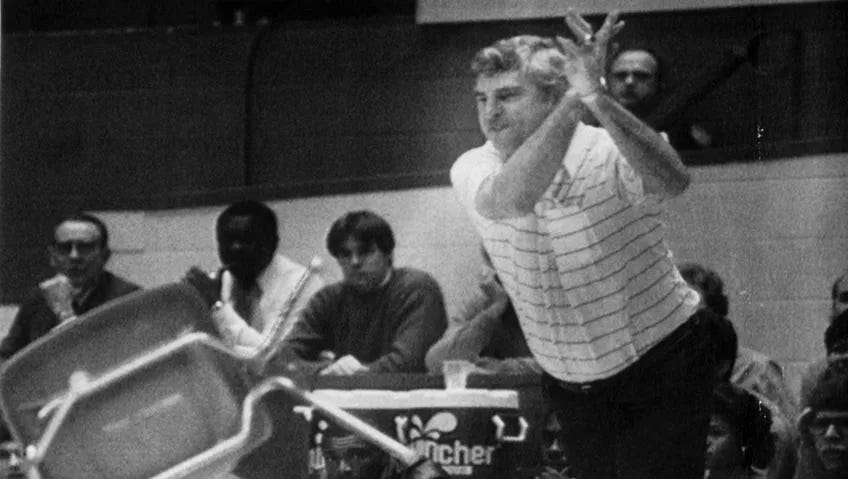
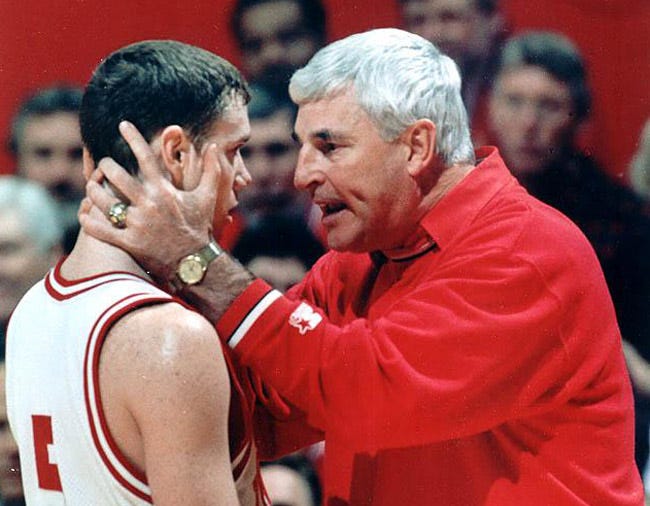
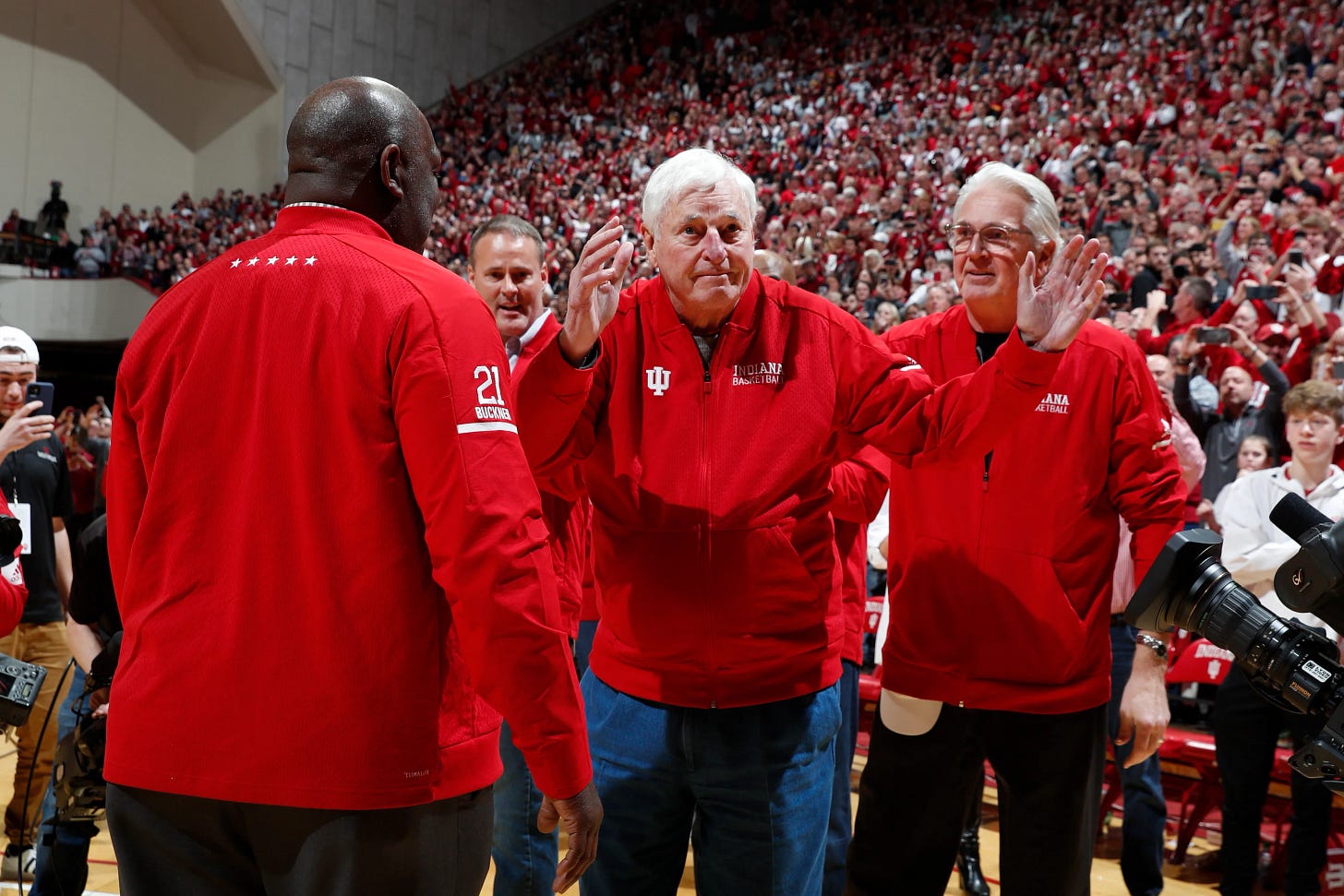
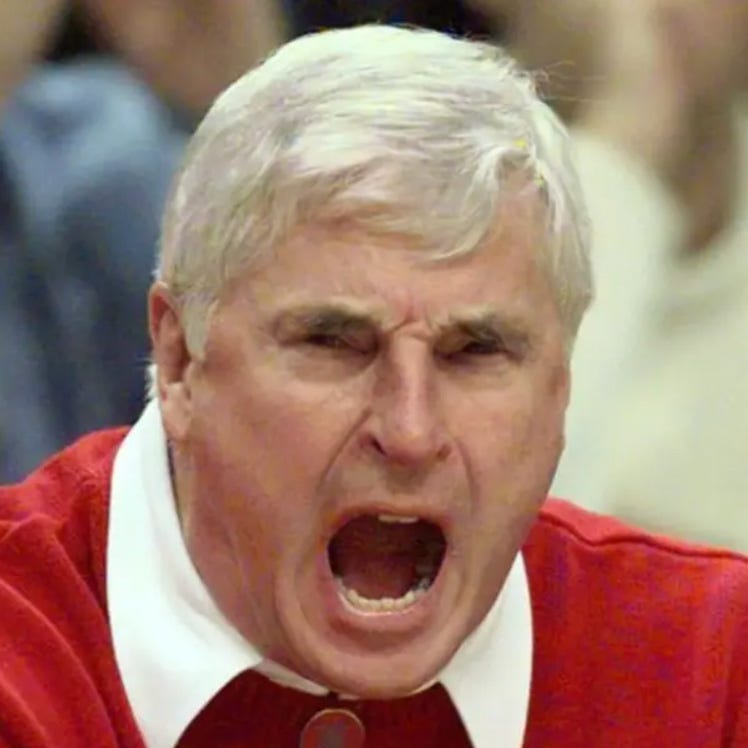
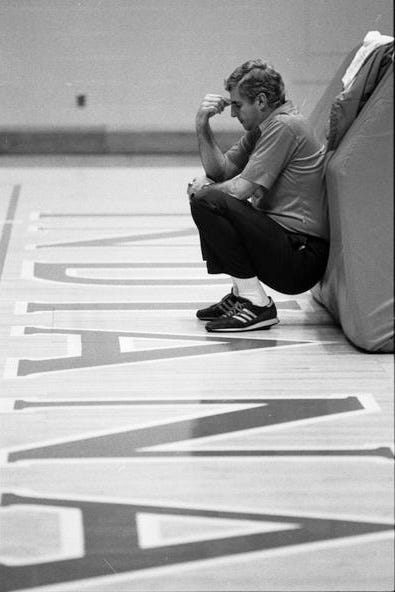
https://www.facebook.com/danpatrickshow/videos/714550766791632/